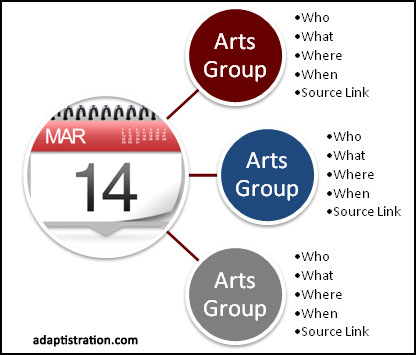Community event calendars. Anyone who has had to tackle the task of designing and populating a community calendar knows how much of a pain in the tuches this seemingly straightforward task really is. Those pains are due, in large part, to the complete lack of standards related to how organizations create their respective calendar events, and that needs to change.
Without going into too much geek-speak, the problem centers around how much time and effort it takes to create and maintain an accurate cultural events calendar because even though there are a number of ways to make it extremely easy for arts groups to enter their events into a central system, it doesn’t negate the fact that it takes time; a resource which exists in increasingly diminished supply (and we all know the horse and water adage).
So the only other option is to have a real live person on the concert calendar side of things absorb the data entry duties along with applying event updates throughout the season. If that seems like a reasonable solution, then ask yourself why so many cultural event calendars operated by local newspapers have disappeared or gone fallow.
Fire and Forget

Ideally, a system would exist that can automatically harvest basic event details (who, what, where, when plus a source link) and enter that data into the central calendar. That part sounds simple but it’s where the show falls apart due to the complete lack of event management technology standards among performing arts groups and presenters.
Right now, it’s like a virtual Tower of Babel; there’s no uniform way organizations enter and display that basic data so different systems can’t speak to one another.
Not only do organizations have their own internal event management systems to display event details via their website, those who don’t own and/or operate their own box office platform have to deal with those secondary systems. In a nutshell, it means they end up going through the data input process for each event no less than two times via two different systems.
So it is no wonder that there isn’t a lot of excitement to get behind an idea that requires yet one more round of tedious data input.
Simple is Good
At the same time, the answer is pretty straightforward: the arts field needs to establish a set of technology standards to produce recommended coding guidelines for items unique to the business of presenting live events.

Standards would be vetted by a panel of authorities comprised of leading technology providers along with outside specialists.
The real trick it making it worth everyone’s while. Sure, it would seem that an overriding common interests would have brought these parties together in the first place but conventional wisdom is funny in that it rarely typical or wise.
Ultimately, something will need to exist to sweeten the deal and facilitate buy-in and this is where a number of options exist such as philanthropic support, for-profit sponsorship, or a combination of both. The only important aspect that needs to remain in place is the technology standards panel must remain independent and autonomous of any undue pressures that would ultimately limit coding advancement or favor any existing proprietary platform.
The end result would produce coding standards capable of generating something like a robust and accurate community events calendar that is populated automatically while simultaneously not requiring any additional data input on a per event basis from participating organizations. Equally important is making sure organizations don’t have to rip apart and rebuild existing event management systems in order to take part in the bigger picture. The good news is it’s entirely doable, it just needs some guidance and incentives.
But we can’t get started unless we start talking about it.



I’m glad you brought this up (especially after I blathered on about events management in one of your previous posts)–but YES! I have a difficult enough time with the organizations I’m involved with and trying to populate my own personal events calendar without having to edit after finding some way (there are a few out there) to import events onto another site, say, my own. I would imagine the difficulty for the number of different kinds of events that performing arts organizations have would compound the issue because of the differences in types of events.
I barely qualify as a coding neophyte so have no good answers as to how to do that other than having a mental image of how I would like it to function. Hopefully someone with more experience could talk about some possible solutions!
It turns out that there is an RFC about calendars (an Internet standard for the non-technical.) While the ultimate place to look for this is at the ICANN website, there is an easier explanation at the Wiki article http://en.wikipedia.org/wiki/ICalendar. According to the article, iCalendar is supported already (in whole or in part) by a number of ubiquitous applications such as Google Calendar, Apple iCal, GoDaddy Online Group Calendar, IBM Lotus Notes, Yahoo! Calendar, and Evolution (software) and partially also by Microsoft Outlook.
Arts calendar implementation would probably be best served by building on this protocol.
Incidentally, on a local level, my own preference is the Plaxo calendar that supports multiple Outlook calendars in a way that Google hasn’t yet achieved. As with Google, Plaxo calendars can be shared.
Using the RFC 5545 standard would seem to make a great deal of sense. Actually implementing an on-line calendar then becomes the objective.
Good luck with all of this!
Milan
Right you are, that’s precisely the sort of geek-speak stuff I was alluding to in the post and the iCalendar standards are a good place to begin. Folks familiar with that know that it is still tricky business (in short, turning those values into data input as opposed to display only items) and it may even be a bit more complex than what is needed for these purposes. Regardless, I would be surprised if a standards panel wouldn’t look to that as a framework for moving forward.
I’ve looked into this sort of thing in the past, and I’m pretty sure there are a handful of Javascript and PHP libraries that can parse .ics feeds. Alternatively, you can just read them. They’re not jibberish. A little string matching would go a long way.
I will say, however, that it might be nice to develop a separate system. It would be nearly trivial to create an XML schema and matching web-based editor. In doing so, the backend would be much more use-specific and the resulting data would be more computer-readable.
You’re absolutely on the right track (IMHO), the first step is to keep it very, very simple and get a system in place that can read a straightforward Who, What, Where, When list of fields and to make sure event management and box office solutions use the standards related to those fields in order to allow a system the ability to parse the data into something usable. I’ve been digging into some recent efforts elsewhere into this since publishing the post and it seems most efforts get tangled up in trying to go too far too soon instead of aiming for and implementing this simple, but enormously useful, first step.